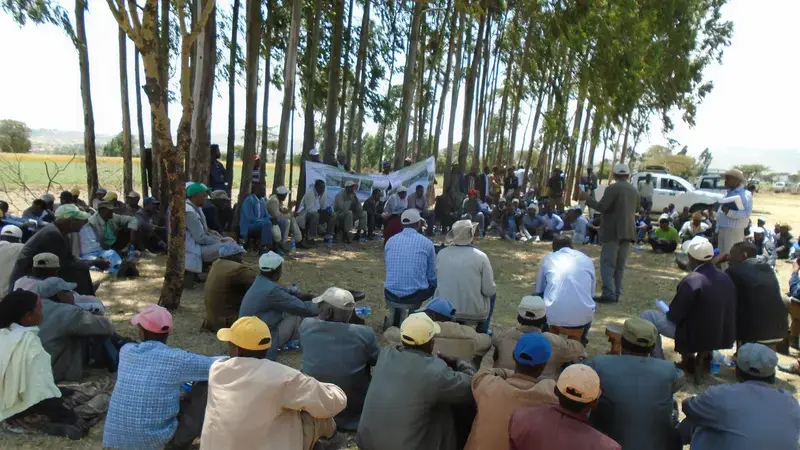Partnering with Ethiopian farmers for quick deployment of malt barley and grain legume varieties

More than 4.5 million smallholder farmers grow barley in Ethiopia with one of the lowest yields in the world. Getting new higher-yield varieties is a national priority. Working with the Ethiopian Institute of Agricultural Research (EIAR), ICARDA scientists are working to develop barley, faba bean and chickpea varieties that are resistant to drought, disease and pests and give a higher yield.
As East African economies continue to grow, the demand for health food and malt beverages is increasing, expanding livelihood opportunities for Ethiopian farmers. Ethiopia is the largest producer of barley and faba bean in Sub-Saharan Africa, and both crops are important for smallholder farmers.
To meet the demand for barley, faba bean, and chickpeas, Ethiopia must produce in much larger quantities with a much higher yield. ICARDA is working with seed producers to accelerate the production and multiplication of new seed varieties. In 2014, the Holetta Agricultural Research Center (HARC) began a community seed production program by organizing farmer groups in Kersa Malima, Jeldu and Wolmera districts of South and West Shoa.
With the support of ICARDA, HARC organized a training-of-trainers course on community seed production for development agents, subject matter specialists and for the District Bureau of Agriculture and Administration. In turn, trainers organized and trained seed producer groups with 140 farmers, focusing on quality seed production, marketing, and management of local seed businesses.
ICARDA, in cooperation with local farmers and EIAR procured certified seed to produce quality seed in target districts earlier this year. Malt barley, faba bean and chickpea seeds were procured and distributed with bio-fertilizers in five districts and planted in clusters by local farmer groups. A total of 19.4 tons of faba bean, chickpea, and malt barley seed were distributed and 151.53 ha were planted, producing 303 tons of seed for the coming season.
This past October, HARC organized a field day on faba bean, chickpea and malt barley seed production in collaboration with the Bureau of Agriculture of Kersa Malima District and ICARDA, with 156 participants (11 female) drawn from key stakeholders at federal, regional, zonal and district levels. Participants visited the community seed production fields where farmer seed producers explained the management of seed production fields, their perceptions and expectations from their engagement in local seed production. The field visit was followed by discussions by participants on a number of key issues:
Farmer seed producers groups: Farmers were identified, trained and clustered for seed production and registered by Bureau of Agriculture (BoA). Kersa Malima district BoA and HARC will take the necessary steps to get the farmer associations licensed as seed producers at the regional level.
Seed production: Farmers received basic seed from HARC and Oromia Seed Enterprise and followed all the technical aspects of seed production to ensure quality. The seed production fields were well managed with some minor adjustments to maintain the quality. Farmers have agreed to undertake the additional steps necessary during harvesting, cleaning and storage to ensure quality with the support of the development agents from BoA, HARC and ICARDA.
Seed quality assurance: The zonal seed quality control office initiated field inspection of seed production fields on the invitation of BoA and has already taken the necessary steps and provided feedback on seed production fields. The office has agreed to continue with technical assistance for the farmer associations to register as seed producers and ensure that the seed approved as certified seed.
Seed marketing: As seed is marketed through farmer cooperatives at the district level, registration of seed producers will soon pave the way for marketing certified seed, benefitting farmers and filling some of the demand.
Read more about how barley is changing livelihoods in Ethiopia, or watch a short VIDEO.
Participants also made a visit to the malt barley production site for 6,000 small-scale farmers being facilitated by Techno Serve on behalf of Diego Brewery. While the project aims to reach 20,000 farmers by the end of the three year project, availability of certified seed remains a serious constraint for expansion. Building partnerships is key to ensuring that certified seed stays available to Ethiopian farmers.
“We need to seize the opportunity that presents itself in commercialization of the agricultural sector in the country, particularly for malt barley,” said Dr. Adgugna Wakjira, Deputy Director of EIAR.
ICARDA’s malt barley project, supported by USAID, works with research and development partners at all levels and operates in four major crop production regions of Ethiopia.
